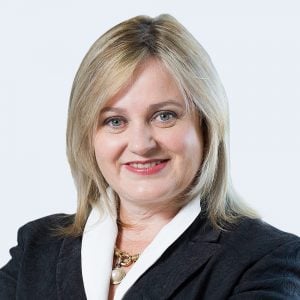 Elize Botha, MD of Old Mutual Unit Trusts shares her views on the need for the asset management industry to follow responsible investment practices; provides insight into how asset managers can reach millennial investors; and explains why the industry should work to simplify its conversations with investors and eliminate jargon.
Elize Botha, MD of Old Mutual Unit Trusts shares her views on the need for the asset management industry to follow responsible investment practices; provides insight into how asset managers can reach millennial investors; and explains why the industry should work to simplify its conversations with investors and eliminate jargon.
What are the most pertinent challenges facing asset managers today?
With the rise of the internet and the popularity of social media, a lot of people have developed a need for immediate gratification. However, as an asset management industry, we need to focus on long-term investing to achieve optimal growth for our clients. So that is a very tough challenge. People who are used to immediate gratification don’t want to hear that they have to wait for their money to grow.
Another challenge that is becoming more pertinent, as our population grows, and environmental factors increase, is finding a way to sustainably invest in a future that matters. That is something the asset management industry needs to think about.
Then, in South Africa, we’re in a technical recession and a low growth environment which means that asset managers are faced with the challenge of getting CPI+ returns, especially in terms of growth portfolios where most of the asset classes are struggling.
Lastly, I would say the other main challenge facing us in the industry is AI. How do you embrace technology and bring robotics closer to the business?
What is Old Mutual doing to cope with these challenges?
We are communicating a lot, especially in light of the low-growth environment and investors’ need for immediate gratification, to try and build awareness around the fact that investment growth takes time.
With regards to sustainable investment, we embed the principles of environmental, social & governance in our processes. In fact, we’re launching a new fund at the end of the month that will specifically look at how to invest more responsibly in the planet.
When it comes to technological advancement, I think it’s every asset manager’s job to keep an eye on what’s happening in the market to make sure that your business is future fit and that you’re investing in innovation. It is crucial to innovate to ensure your business doesn’t become stale, especially in this time where things change so quickly.
The Old Mutual Millennial Survey showed that SA millennials are more likely to save their money in a bank account than invest in a unit trust, for various reasons, including a lack of education about investment products. How has the information gained from this survey influenced your strategy in terms of targeting millennial investors?
With the insight gained from this study, the first thing we did was speak to financial advisors to bust some of the myths about millennials. Financial advisors are still very valuable in helping to allocate capital, but we found that many of them believed that millennials are fickle, don’t like financial advisors and don’t have money.
To change this perception we are partnering aggressively with the financial advisors that work with Old Mutual, to highlight the fact that millennials are actually a very broad investor base both in terms of age and income, and that they are really important if you want your business to have a future.
We’ve also been speaking to the media a lot to educate millennials and help them understand how inflation works. It’s not wrong to invest in a bank account, but medium to long-term if you want to outpace inflation it’s not necessarily the best strategy. We are also trying to show millennials that you don’t need a lot of money to start investing.
We try to spread these messages as widely as possible using video clips and social media, and are actively working to regain the trust of millennials.
On top of this, we are also working to make it as easy as possible to invest. Millennials are used to immediate gratification. They don’t want to struggle, so you need to make sure your process is easy.
In what ways does Old Mutual use technology to overcome challenges and enhance your competitiveness?
If you want to attract millennial investors, you need a technical online buy capability – which is something we’ve had for a few years. But we are in the midst of enhancing this capability to make investing even easier. We’re working to eliminate paper and implementing processes to automatically verify investors to reduce the amount of documentation that has to be completed.
We’re also using machine readable news in some of our investment groups to go through the mountain of news articles written on companies that we invest in and highlight the most relevant articles for us to look at.
In addition to these initiatives, in the broader Old Mutual Group, there are also a number of other technologies we use to ensure that we remain technologically relevant.
In which areas of the asset management do you see the most room for complete overhaul, or genuinely fresh thinking?
The first area I think there is room for complete overhaul is responsible investing, which is something that we are passionate about at Old Mutual. We want to create growth for our clients, but profit at any expense is not ok. We have believed this for a while.
As an industry, we cannot keep investing in companies that are bad for the environment or that don’t care about social practices.
The second thing that asset managers should look at is eliminating unnecessary complexity.
We’ve built this industry from something simple into something complex and I think an overhaul is needed to make it simple again.
What can SA fund managers and financial services firms do to make investing more accessible to all South Africans, especially women?
As an industry I really believe we do have clients’ interests at heart but we have this way of speaking to people – using a lot of jargon. We often don’t even realise we are doing it, as we are so used to the jargon. But it is difficult for investors to understand, and what people don’t understand they don’t trust. So I think one of the biggest things we need to do is speak to people in a way they understand.
We also need to simplify what we’re saying to our investors and what we are offering them. We make investing sound like this absolute minefield, which it can be, but it shouldn’t be. I think that is the biggest task we have – to get people to believe in us.
When it comes to making investing accessible to women, as an industry we need to encourage women to be active participants in building a better future.
Women are taught as little girls, depending on the culture we are born into, that your greatest day is going to be your wedding day, that there will be no better day than that.
I’m saying no, there are a lot of days that will be better than that day. We need to say to women: yes, it’s fantastic to be a partner, it’s fantastic to be a mother but it is even more fantastic to be financially independent and never have to worry about how you are going to feed yourself or your children.
This is the message the industry needs to send. Women are not just here to live happily ever after, we’re here to craft careers and change our country.
What are some of the future trends you see in the SA asset management space?
Definitely AI and how it can be used to drive quantitative investing. But also, how we can use AI, machine learning and big data to engage better with our clients. These things are going to become far more important than they were in the past.
Then we’re also seeing a greater focus on passive investments and investors are becoming more aware of fees, so there is a great race to drive fees down, which will continue into the future.



